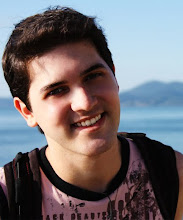Thursday, September 24, 2009
Sound, half of the experience.
Sound is definitely half of the experience, it is so important that can completely change the meaning of what we're seeing in the screen.
According to the text, sound in cinema is primarily vococentric, it always privileges the voice, because who's watching the film is mostly concerned to understand the words, to familiarize with the context, to absorb the meaning of what the actors are saying, and after he's completely comfortable with it, then he starts to pay attention to the background and the sounds surrounding it. The ear analyzes, processes and synthesizes faster than the eye, that is the reason the sound is deeply explored in film, like in an horror movie when you feel completely tense not because of what is showing in the screen, but for the soundtrack is playing; also because in an horror movie usually the action scenes contains fast cuts and camera movements, which also takes more time for your eye to acknowledge everything that is happening. The eyes perceives more slowly because it has more to do all at once.
Thursday, September 17, 2009
Cameraless Filmmaking
I never thought that one day I would be in a class with a 16mm filmstrip, scratching, painting, using inks, cutting magazines and newspapers in order to make a movie, actually I feel really dumb 'cause I never heard of this technique before.
This project helped me a lot in terms of managing the time within the frames, it's amazing how we can achieve incredible results by only messing around with some art stuff, we can create a good rhythm within our film just by acquiring a good sense of how to work with the frames in order to have a smooth result. What is most exciting about all of this is that the subject of the film is our creativity, so it can goes as far as our mind goes (also as weird as our mind can be), so if I wanted a big cloud in the sky burning into fire for 2 seconds, I will have it.
The technique of attaching pieces of magazine and newspaper to the tape is awesome! I felt like editing a film with my own hands, like how they used to do in the past, but with the visual material of my choice.
In the Dark Room I think we needed a second chance, to be honest. After I looked the result of my first film, new ideas just pop into my mind, some things we definitely need to look the "after" to improve the "before". Even not having a second chance I got a good idea of how we can explore this technique to its maximum potential.
Thursday, September 3, 2009
Synesthesia
Imagine yourself reading this text and for each word I say you assume one different color, or looking at a beautiful sunset and tasting sweet in your mouth, these are just some of the manifestations of Synesthesia.
Synesthesia is indeed an amazing concept. It's also crazy to think that someone can actually taste colors and see sounds, I took a moment to think, for example, what does the colors taste, but I wound up being influenced by previous experiences with food, like saying that red tastes Ketchup, I’m unable to separate these experiences.
I was researching about it and I found that various artists and musicians described synesthesia as an important component of their job, like Pharrel Williams (musician), Vladmimir Nabokov (composer), David Hockney (painter) and others...
It is not considered a mental illness, just one different way of interpret things; In the past, it was considered just the source of some creative minds, nowadays it has been a huge research field to help us to comprehend the functionality of our brain.
Synesthesia has wisely been explored in the Audiovisual Industry, I love music videos and I guess I will be posting a lot of them here throughout the semester.
Magnetosphere - Tosca
Star Guitar - Chemical Brothers
Both of them are brilliant, you can see the music happening. Star Guitar has the rhythm of a train journey, and for some people can take some time to understand that the landscape is the music.
